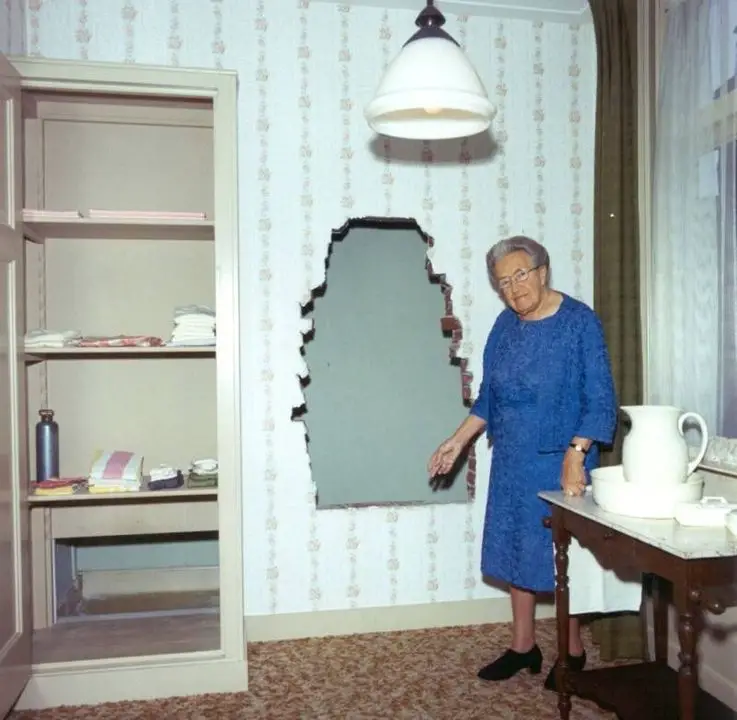
When Nazi Germany tightened its grip on the Netherlands in the early 1940s, one ordinary family in the city of Haarlem decided they could not stand by. Corrie ten Boom, a watchmaker, along with her deeply religious family, transformed their modest home above a clock shop into a sanctuary — a place where hundreds of Jews found safety from the horrors of Nazi persecution.

By the time their work came to an abrupt end in 1944, the ten Booms had helped rescue an estimated 800 people. But their story is not only one of bravery — it is also one of faith, loss, and a remarkable ability to forgive.
Early Years in a Faithful Family
Corrie was born Cornelia Arnolda Johanna ten Boom on April 15, 1892, the youngest of four children in a close-knit Calvinist household. The family lived together above the watch shop run by her father, Casper, a gentle man whose patience and skill with fine mechanics were legendary.
Corrie grew up surrounded by the ticking and chiming of clocks, finding joy in the orderly world of watchmaking. After the loss of her mother and the end of a romance, Corrie decided to follow her father’s trade. In 1922, she became the first licensed female watchmaker in the Netherlands — a rare accomplishment for a woman at that time.
Outside of work, she led a Christian youth group for girls, teaching both practical skills and Bible lessons. Life in Haarlem was simple and steady — until the Second World War changed everything.
The Nazi Occupation of the Netherlands
In May 1940, the German army invaded and swiftly occupied the Netherlands. At first, daily life seemed to go on, but the oppression of the country’s Jewish population escalated quickly. Arrests and deportations became a regular occurrence.
The ten Booms, firm in their Christian belief that all people are equal before God — and holding a special respect for Jews as “God’s ancient people” — could not turn away from those in danger. When a Jewish woman named Kleermaker knocked on their door seeking shelter, Casper welcomed her without hesitation:
“In this household, God’s people are always welcome.”
Word spread quickly among the underground resistance. Soon, strangers arrived seeking refuge, and the ten Booms became an important link in a network moving Jews to safer hiding places.
The Secret Room
To protect their guests, the family built a hidden compartment in Corrie’s bedroom. Though small — about the size of a narrow closet — it could hold six people and had a ventilation system for air. A buzzer system warned occupants to hide if danger approached.
Despite the fear outside, the atmosphere inside was often warm. Those in hiding played music, rehearsed plays, and shared meals with the family. But in February 1944, tragedy struck.
Betrayal and Arrest
On February 28, 1944, a Dutch informant alerted the Gestapo to the ten Booms’ activities. The Nazis raided the home, arresting 30 people, including Corrie, her sister Betsie, and their father. Remarkably, the hidden Jews were never found.
Eighty-four-year-old Casper was offered his freedom if he promised to stop helping refugees. His response was firm:
“If I go home today, I will open my door again to any man in need who knocks.”
Ten days later, he died in prison.
Life in the Camps
Corrie and Betsie were moved from prison to the Vught concentration camp, and later to Ravensbrück — a brutal women’s camp in Germany. Life there was harsh beyond words: starvation, disease, and cruelty were constant. Betsie grew weaker but remained steadfast in her faith, often speaking of love and forgiveness even toward their captors.
Before her death on December 16, 1944, Betsie told Corrie:
“There is no pit so deep that God’s love is not deeper still.”
Only 12 days later, Corrie was unexpectedly released — the result of a clerical error. She later learned that all women her age remaining in the camp were executed shortly afterward.
A Life Devoted to Healing and Forgiveness
After the war, Corrie returned to Haarlem and opened a rehabilitation center for survivors of the camps, as well as for Dutch citizens who had collaborated with the Nazis but now needed help rebuilding their lives.
In the decades that followed, she traveled to more than 60 countries, telling her story and sharing her belief in forgiveness. In 1947, during a church meeting in Munich, she came face to face with a former Ravensbrück guard. Though the memories of cruelty were fresh, she chose to forgive him — living out the very message she preached.
Corrie’s memoir, The Hiding Place, became an international bestseller, inspiring millions with its message of courage and grace.
Death and Legacy
Corrie ten Boom passed away on April 15, 1983 — her 91st birthday. In Jewish tradition, dying on one’s birthday is considered a sign of a completed mission in life.
Israel honored Corrie, Betsie, and Casper as Righteous Among the Nations, a title given to non-Jews who risked their lives to save Jews during the Holocaust. Their former home in Haarlem is now the Corrie ten Boom House, a museum dedicated to telling their story.
More than 800 lives were saved because one family chose compassion over fear. Corrie’s life continues to serve as a reminder that even in the darkest times, ordinary people can choose extraordinary love.





Leave a Reply